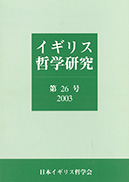Volume 26
Displaying 1-11 of 11 articles from this issue
- |<
- <
- 1
- >
- >|
-
2003 Volume 26 Pages 5-20
Published: March 20, 2003
Released on J-STAGE: April 25, 2018
Download PDF (1580K) -
2003 Volume 26 Pages 21-38
Published: March 20, 2003
Released on J-STAGE: April 25, 2018
Download PDF (1639K) -
2003 Volume 26 Pages 39-52
Published: March 20, 2003
Released on J-STAGE: April 25, 2018
Download PDF (1456K) -
2003 Volume 26 Pages 53-71
Published: March 20, 2003
Released on J-STAGE: April 25, 2018
Download PDF (1673K) -
2003 Volume 26 Pages 73-86
Published: March 20, 2003
Released on J-STAGE: April 25, 2018
Download PDF (1275K)
-
2003 Volume 26 Pages 87-91
Published: March 20, 2003
Released on J-STAGE: April 25, 2018
Download PDF (608K)
-
2003 Volume 26 Pages 92-108
Published: March 20, 2003
Released on J-STAGE: April 25, 2018
Download PDF (1739K)
-
2003 Volume 26 Pages 109-118
Published: March 20, 2003
Released on J-STAGE: April 25, 2018
Download PDF (1115K)
-
2003 Volume 26 Pages 119-121
Published: March 20, 2003
Released on J-STAGE: April 25, 2018
Download PDF (363K)
-
2003 Volume 26 Pages 122-129
Published: March 20, 2003
Released on J-STAGE: April 25, 2018
Download PDF (777K)
-
2003 Volume 26 Pages 131
Published: March 20, 2003
Released on J-STAGE: April 25, 2018
Download PDF (203K)
- |<
- <
- 1
- >
- >|
